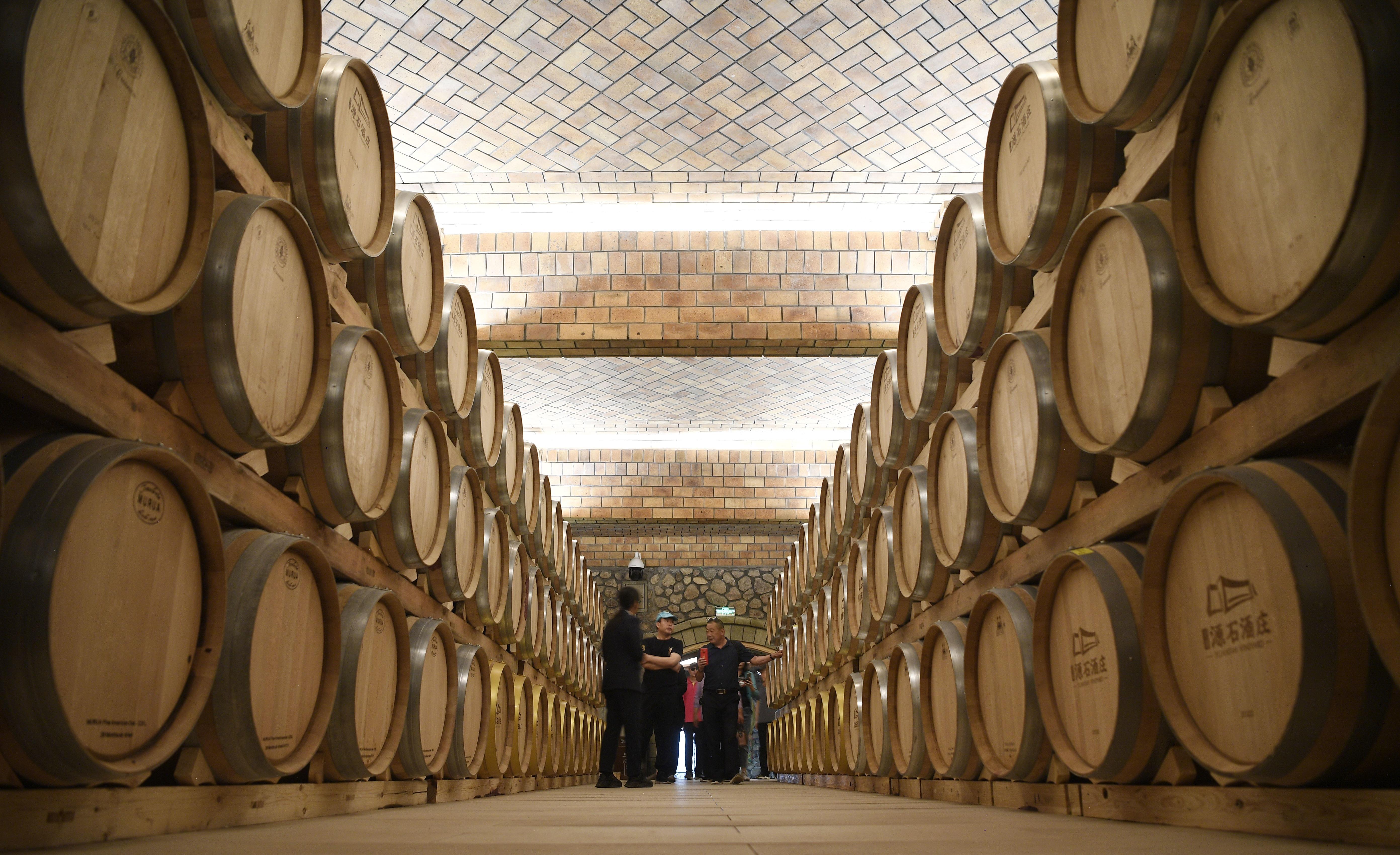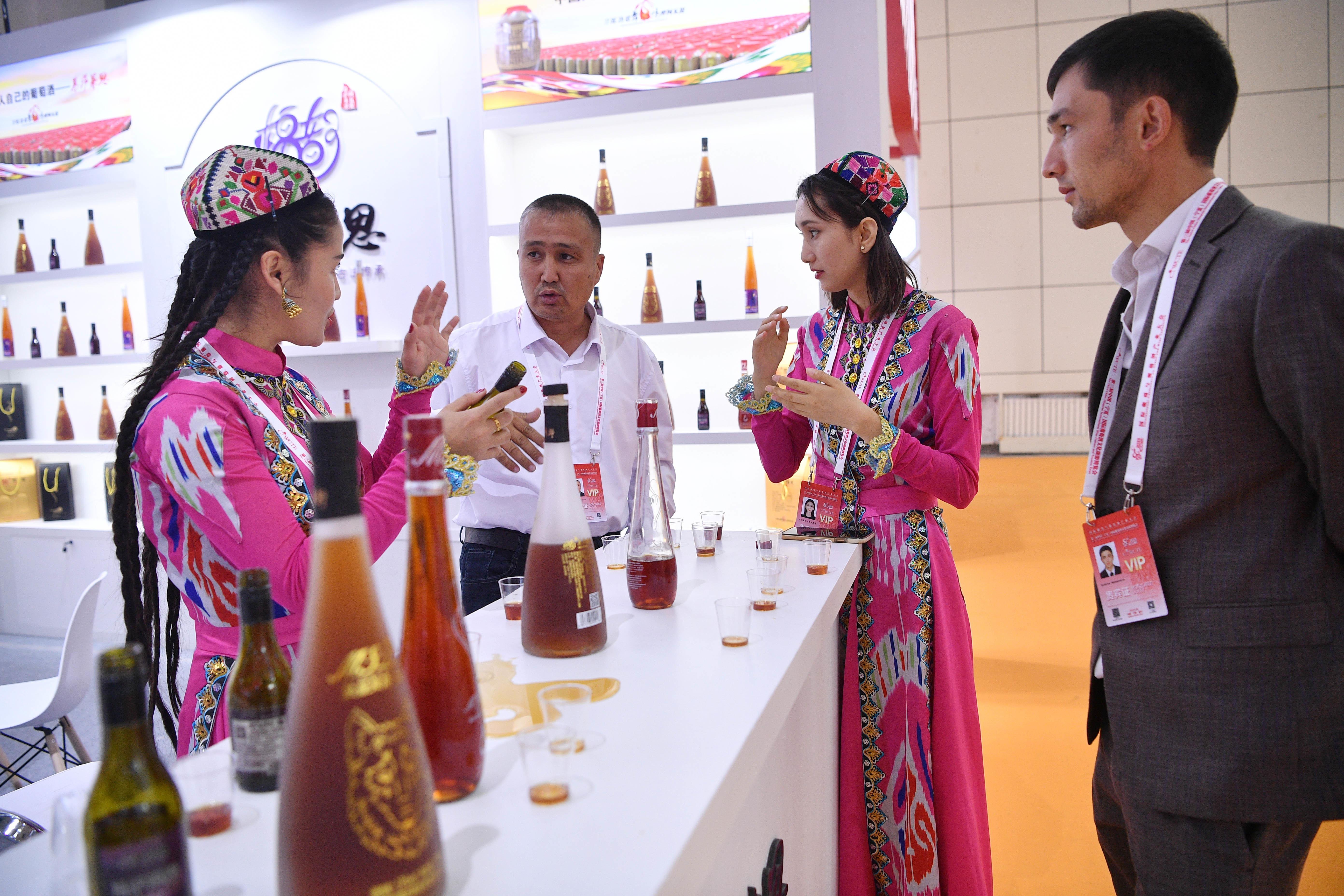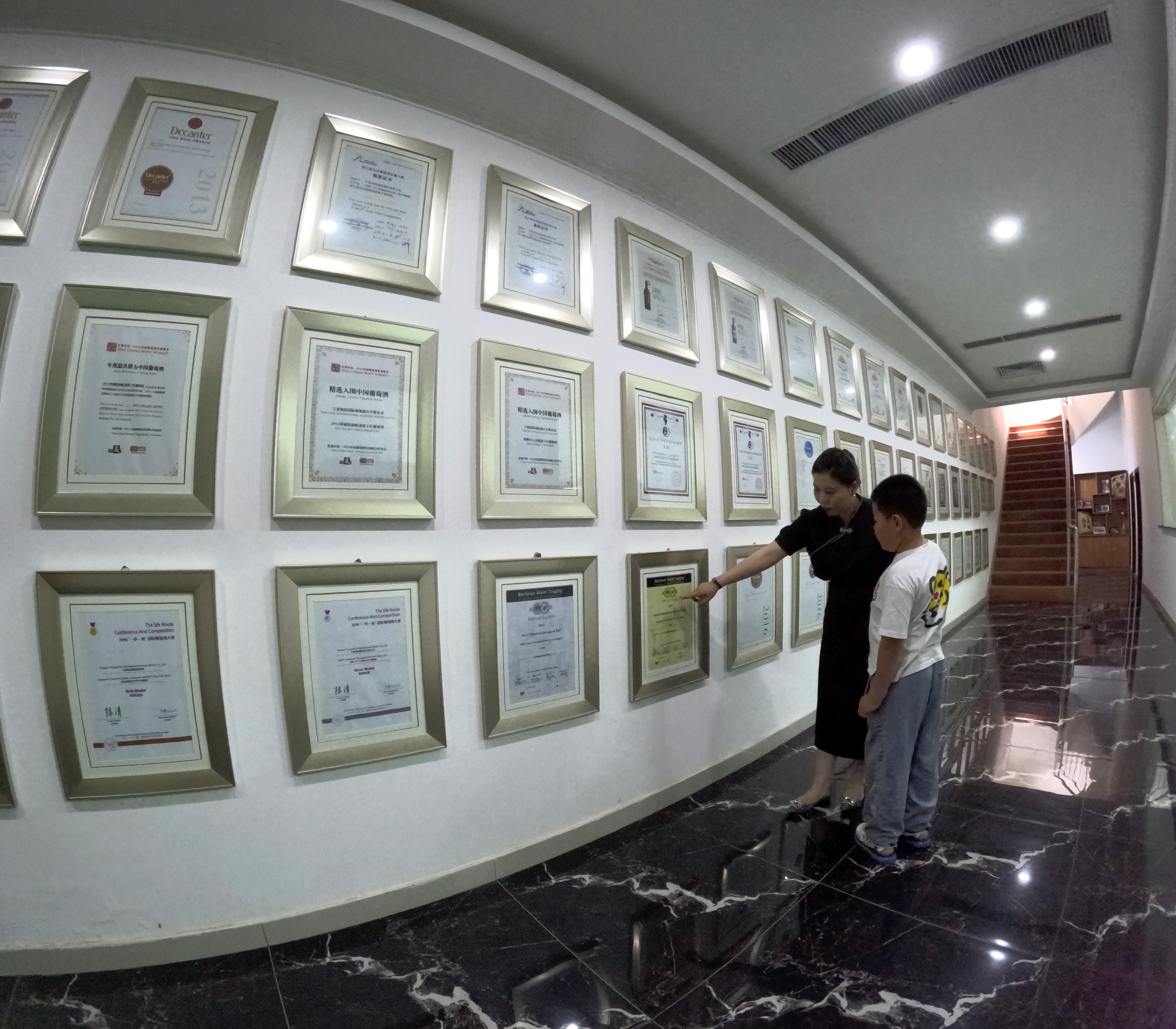The autonomous region's vineyards are seeing growing demand for their products. Zhu Baoxia, Yan Dongjie and Hu Dongmei report from Yinchuan.
 An exhibitor from Georgia introduces his wine to attendees of the International Conference on Grape and Wine Industries in Yinchuan on June 9. (PHOTO / XINHUA)
An exhibitor from Georgia introduces his wine to attendees of the International Conference on Grape and Wine Industries in Yinchuan on June 9. (PHOTO / XINHUA)
Dozens of certificates hang in the hallway of the home of He Yangyang, who runs the Ningxia Yangyang International Winery.
The certificates detail awards won at international competitions, such as the Decanter World Wine Awards, the Berlin Wine Trophy, the Belt& Road Wine and Spirit Competition, and the Bettane and Desseauve Wine Awards in France.
"All these certificates come from before 2018. We don't hang any won after that because it's not new for Ningxia wineries anymore, as they just sweep international competitions," He said.
Just a few days ago, a list from the Decanter World Wine Awards in the United Kingdom showed that more than 40 gold medals were awarded to wines produced in the Ningxia Hui autonomous region.
Ningxia, in Northwest China, has over 200 wineries, more than 60 of which have won at least 1,000 awards in a wide range of competitions across the globe.
In the past 20 years, Ningxia has vigorously developed its grape and wine industry. The region now has nearly 40,000 hectares of wine grapes under cultivation and 228 wineries and vineyards. Annual production is 138 million bottles.
The wines are exported to more than 40 countries and regions, generating an annual income of more than 34 billion yuan ($4.76 billion).
"Ten years ago, if we wanted to have wine, we would go to international supermarkets in Shanghai to find French or Chilean imports. Now, when I return to the UK from trips to China, my friends ask me to bring Ningxia wine for them," said wine enthusiast Fan Yue, who works in the UK finance industry.
Earlier this month, he flew back to Yinchuan, Ningxia's capital and his hometown, to attend the 2023 International Conference on Grape and Wine Industries.
The event was China's first-ever international wine industry conference. More than 1,000 representatives of companies and growers from wine-producing regions gathered in Yinchuan to share wine, wine culture and technology, and also learn about the development, innovation and growth of the industry in China.
As such, Ningxia's wineries have been busy receiving visitors and signing contracts with businesses from around the world, with orders totaling over 5 billion yuan and investment deals exceeding 30 billion yuan signed during the conference.
 Tourists visit the Yuanshi Winery which is located in the foothills of the Helan Mountains in Yinchuan on June 10. (PHOTO / XINHUA)
Tourists visit the Yuanshi Winery which is located in the foothills of the Helan Mountains in Yinchuan on June 10. (PHOTO / XINHUA)
Overseas orders rising
According to Zeng Xiaojun, owner of Chateau Lansai, in recent years the overwhelming volume of orders has seen her 1,000-square-meter-plus wine cellar struggle to store bottles of wine waiting to be delivered.
At present, she is busy preparing to expand the cellar space to accommodate the growing number of orders from overseas.
Zeng said the winery is in discussions with Costco, a supermarket chain in the United States, so wine lovers in the US may soon enjoy high-quality wines produced in Ningxia.
Like Chateau Lansai, wines from the Copower Jade Winery have been among the early pioneers of opening-up to the international market.
Last month, Copower's wine was presented at an expo in the British Museum in London, where it was exposed to first-line buyers and distributors from around the world.
Zhang Yanli, Copower's owner, expressed confidence that the show would promote the development of Ningxia wines in the British market.
Located in the eastern foothills of the Helan Mountains, which run along the 38th parallel north, the Earth's golden ratio line, Ningxia has many conditions that are conducive to the development of the local wine industry.
For example, the abundant light and heat, soil filled with rare elements, and daily temperature fluctuations have created a unique natural environment that is ideal for growing quality grapes and producing high-end wines.
Those factors mean that many experts regard the area as one of the best wine-growing regions in the world, alongside Burgundy in France and the Napa Valley in the US state of California.
He Hong, owner of the Ningxia Yangyang International Winery, has devoted over two decades of study and research to winemaking in the region. The area's unique natural conditions, paired with a continental climate, make the region highly suitable for producing great wines, he said.
 An attendee talks with exhibitors at the 2023 International Conference on Grape and Wine Industries in Yinchuan on June 9. (PHOTO / XINHUA)
An attendee talks with exhibitors at the 2023 International Conference on Grape and Wine Industries in Yinchuan on June 9. (PHOTO / XINHUA)
Guidance, energy
President Xi Jinping visited Ningxia in 2016 and 2020, showing great interest in the local wine grape industry. In 2016, he pointed out that the Chinese wine market's potential was enormous, and the grape wine produced in Ningxia had excellent market potential.
As such, he encouraged the comprehensive development of Ningxia's wine grape industry and emphasized the need to adhere to the chosen development path.
In 2020, Xi further urged Ningxia to integrate the development of the wine grape industry with improved management of the banks of the Yellow River and environmental restoration. He also emphasized the need to improve technological capabilities, increase cultural connotations, improve publicity and promotion, and build the Ningxia grape wine brand.
He believed that in due time Chinese wine grapes would "astonish the world", which would provide direction, guidance and energy for the development of Ningxia's high-quality industry.
Xi also visited the Yuanshi Vineyard, which was a sand quarry two decades ago. In response to the call to improve the environment, the vineyard's owner, Yuan Yuan, introduced water from the Yellow River. By nourishing the land and planting trees, he transformed a barren sand pit into a park with artificial lakes and vast vineyards.
Beating desertification
Yang Ying, a staff member at the vineyard, said Yinchuan's location in Northwest China meant the land was heavily desertified in the past. However, the sparse sandy soil, which is rich in trace elements, is suitable for grape cultivation.
Now, the continuous planting of grapevines in Ningxia has played an effective role in lowering wind speeds and fixing the sandy soil.
"Compared with 10 years ago, there are fewer days of windy and sandy weather now," Yang said.
At the end of the last century, the government, businesses and people from all walks of life in Ningxia realized the importance of protecting the local ecosystem and improving the environment. As a result, large areas of green forests were planted at roughly the same time.
As of 2021, Yinchuan had more than 333,000 hectares of ecological afforestation, with a forest coverage rate of 13.5 percent and a built-up area greenery rate of 40.68 percent, ranked first among provincial capitals in Northwest China.
 He Yangyang shows her son the awards her wine has won in international competitions. (PHOTO / XINHUA)
He Yangyang shows her son the awards her wine has won in international competitions. (PHOTO / XINHUA)
Environmental restoration
The restoration of the environment in the Helan Mountains has achieved remarkable results.
As a result, Yinchuan was included in the world's first batch of international wetland cities, and was a demonstration city for the treatment of black and malodorous bodies of water in China.
In 2008, Ningxia's regional authorities issued the instruction: "With extraordinary perseverance and determination, we must take our region's grape industry to the top. We will not rest until we become the best in China."
In response to the government's call, a group of entrepreneurs who felt confident about the grape wine industry invested in vineyard construction. Also, many entrepreneurs from all over the world came to Ningxia, reclaimed wasteland and created vineyards.
He Hong, the Yangyang winery owner, said grapes are relatively drought-resistant and require annual precipitation of 600 to 800 millimeters for optimum growth.
Grapes require a lot of sunlight, and Ningxia's long hours of daylight are particularly beneficial for their growth, while fluctuations between temperatures in the day and at night help to deposit sugar and nutrients in the grapes, thereby improving their quality.
Ningxia's climate fully meets these conditions, which is why the quality of the region's wine is among the best in the world, he said.
In turn, grape cultivation has had a positive impact on the environment as grape roots are well-developed and can stabilize sandy soil.
"Ningxia's soil and water nurtured high-quality grapes, and hundreds of thousands of hectares of grapevines nourished this land," He Hong said.
Last week, during his online speech at the opening ceremony of the International Grape and Wine Industry Conference, Pau Roca, director general of the International Organization of Vine and Wine, said climate change remains a major challenge for the world, and the grape and wine industry can make a beneficial contribution.
"China has all the potential in research and new technologies to have its rightful share in shaping the global vine and wine tendencies," he said,
"Ningxia's success is in becoming the first Chinese pilot zone ... we now look forward to having China as a full member (of the organization) very soon, with all the rights and influence your nation deserves."
Contact the writers at yandongjie@chinadaily.com.cn


